
The Ministry of Environment is drafting the national strategy of payment for environmental services for implementation starting in 2024. The Ministry explains this mechanism delivers cash back to individuals, farmers or communities that protect forests and agroforestry systems.
Payments for ecosystem services (PES) are incentives offered to farmers or landowners in exchange for land that is beneficial to the environment. PES have been defined as “a transparent system for the additional provision of environmental services through conditional payments to voluntary providers.” PES seek to promote the conservation of natural resources in the marketplace.
A workshop offered by experts from Costa Rica’s National Forest Financing Fund was the starting point for the drafting of the strategy for payments for environmental services, a management instrument that is established in Law 44-18 of 3 September 2018.
Deputy Minister of Forestry Resources José Elías González said a Pilot Project for Payment for Environmental Water Services is being implemented in the Yaque del Norte River Basin as part of the Strategy for the Implementation of Payment for Environmental Services in the Dominican Republic 2024-2034.
Forestry coverage in the country reaches almost 81% when adding coffee and cacao plantations (43%). Gonzalez explains that the challenge is to make the country’s development compatible with the need to have well-located forests for forestry production, which provide the needed environmental services.
He explained that most of the forests are in private properties. Proposing payment for environmental services is seen as the most suitable instrument to preserve the water and oxygen needed for the well-being of all. The government also issues planting certificates with the right to cut the trees and sustainable forest management.
During the workshop’s opening, Gilmar Navarrete, director of Costa Rica’s National Forestry Financing Fund, stressed that this is only the beginning of a journey that requires “being very patient because the processes do not happen immediately.”
Ivette Regino, representing the United States Agency for International Development (USAID), expressed that supporting the initiative, hand in hand with the Rural Economic Development Dominicana Foundation (REDDOM), is a wise decision.
The training was sponsored by the U.S. Agency for International Development (USAID), the U.S. Forest Service, the National Forestry Financing Fund of Costa Rica and the Dominican Rural Economic Development Foundation (REDDOM).
The workshop is part of the Costa Rica-Dominican Republic Bilateral Project, which is promoted by the Ministries of Economy, Planning and Development, and Environment and Natural Resources.
Read more in Spanish:
Presidency
1 October 2023

